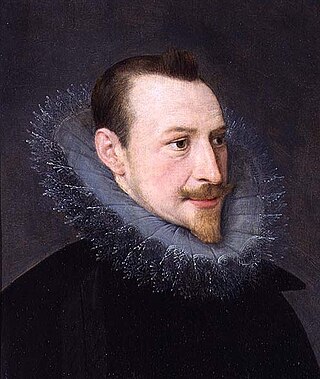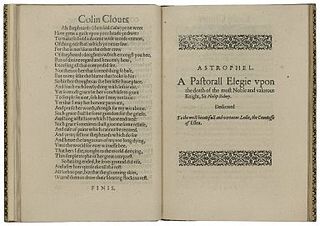
Edmund Spenser was an English poet best known for The Faerie Queene, an epic poem and fantastical allegory celebrating the Tudor dynasty and Elizabeth I. He is recognized as one of the premier craftsmen of nascent Modern English verse and is often considered one of the greatest poets in the English language.

Sir Philip Sidney was an English poet, courtier, scholar and soldier who is remembered as one of the most prominent figures of the Elizabethan age. His works include a sonnet sequence, Astrophel and Stella, a treatise, The Defence of Poesy and a pastoral romance, The Countess of Pembroke's Arcadia.
This article is a summary of the literary events and publications of 1595.
Abraham Fraunce was an English poet.

Mary Herbert, Countess of Pembroke was among the first Englishwomen to gain notice for her poetry and her literary patronage. By the age of 39, she was listed with her brother Philip Sidney and with Edmund Spenser and William Shakespeare among the notable authors of the day in John Bodenham's verse miscellany Belvidere. Her play Antonius is widely seen as reviving interest in soliloquy based on classical models and as a likely source of Samuel Daniel's closet drama Cleopatra (1594) and of Shakespeare's Antony and Cleopatra (1607). She was also known for translating Petrarch's "Triumph of Death", for the poetry anthology Triumphs, and above all for a lyrical, metrical translation of the Psalms.

Elizabethan literature refers to bodies of work produced during the reign of Queen Elizabeth I (1558–1603), and is one of the most splendid ages of English literature. In addition to drama and the theatre, it saw a flowering of poetry, with new forms like the sonnet, the Spenserian stanza, and dramatic blank verse, as well as prose, including historical chronicles, pamphlets, and the first English novels. Major writers include William Shakespeare, Edmund Spenser, Christopher Marlowe, Richard Hooker, Ben Jonson, Philip Sidney, and Thomas Kyd.

Probably composed in the 1580s, Philip Sidney's Astrophil and Stella is an English sonnet sequence containing 108 sonnets and 11 songs. The name derives from the two Greek words, 'aster' (star) and 'phil' (lover), and the Latin word 'stella' meaning star. Thus Astrophil is the star lover, and Stella is his star. Sidney partly nativized the key features of his Italian model Petrarch, including an ongoing but partly obscure narrative, the philosophical trappings of the poet in relation to love and desire, and musings on the art of poetic creation. Sidney also adopts the Petrarchan rhyme scheme, though he uses it with such freedom that fifteen variants are employed.
Nationality words link to articles with information on the nation's poetry or literature.
Nationality words link to articles with information on the nation's poetry or literature.
Nationality words link to articles with information on the nation's poetry or literature.
Nationality words link to articles with information on the nation's poetry or literature.
Nationality words link to articles with information on the nation's poetry or literature.
Nationality words link to articles with information on the nation's poetry or literature.
Nationality words link to articles with information on the nation's poetry or literature.
Nationality words link to articles with information on the nation's poetry or literature.
Nationality words link to articles with information on the nation's poetry or literature.
— From Sir John Harington, A New Discourse of a Stale Subject, called the Metamorphosis of Ajax
Nationality words link to articles with information on the nation's poetry or literature.
Nationality words link to articles with information on the nation's poetry or literature.

Astrophel: A Pastorall Elegy upon the Death of the Most Noble and Valorous Knight, Sir Philip Sidney is a poem by the English poet Edmund Spenser. It is Spenser's tribute to the memory of Sir Philip Sidney, who had died in 1586, and was dedicated "To the most beautiful and vertuous Ladie, the Countesse of Essex", Frances Walsingham, Sidney's widow.
This page is based on this
Wikipedia article Text is available under the
CC BY-SA 4.0 license; additional terms may apply.
Images, videos and audio are available under their respective licenses.






